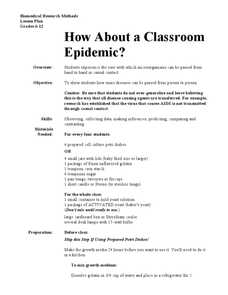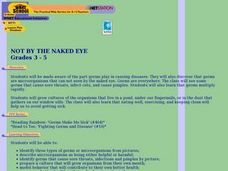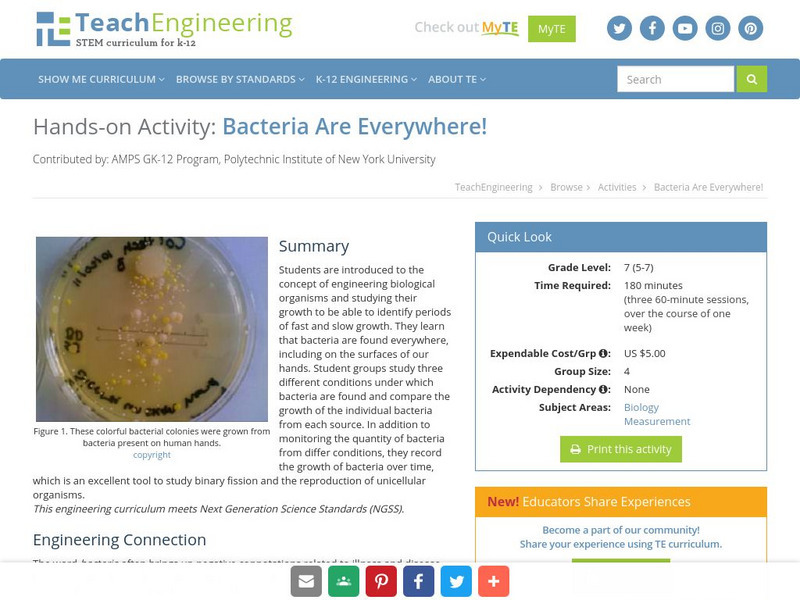Baylor College
Infectious Disease Case Study
Small groups of life science learners look at Allison's symptoms and discuss a diagnosis. They use a chart of illnesses and draw symptom clues from an envelope to determine what illness she has. A lesson like this gives children an...
Baylor College
Post-Assessment: And Now, What Do You Know About Microbes?
Your life science class works in their groups to review the concept maps that they have constructed over the course of a microbiology unit. They share what they have learned with the rest of the class. In a second session, they are given...
Baylor College
Microbes Are Everywhere
In a nutshell, your class will culture bacteria from their choice of surfaces. You will need to prepare or purchase agar plates. If you are new to this classic biology activity, this resource carefully walks you through the process of...
Baylor College
Defending Against Microbes
In the preceding lesson from the unit, beginning biologists discovered that microorganisms are everywhere, so the question follows, why are we not sick all of the time? Class members read and discuss an article in small groups about...
Baylor College
Comparing Sizes of Microorganisms
Kids compare what printed text looks like with the naked eye and under magnification. They discuss the extremely small scale that must be used to measure the size. They learn about the micrometer unit, then draw scale models of a variety...
Curated OER
How About a Classroom Epidemic?
Have individuals wash their hands with soap and water, give one of them a yeast-covered piece of candy, and then have him shake hands with the person next to him. Handshakes continue down the line until everyone in the class has had...
Curated OER
Life in a Drop of Pond Water
Young scholars investigate living creatures that inhabit a pond and explore how various organisms satisfy their needs within their environments. In this life in a drop of pond water lesson, students examine microorganisms under...
Curated OER
Life in the Soil - Is the Soil Alive?
Amaze soil scientists with a list of the myriad of microorganisms residing in a mere 1/4 teaspoon of soil! Then take them on a ride through the carbon cycle, down to the level of decomposers. Finally, give more specific details about the...
Curated OER
Review of Microorganisms
In this microorganism worksheet students complete a series of multiple choice questions on fungi, bacteria and other organisms.
Curated OER
Yeast Power!
Students examine how not all microorganisms are bad and that some can actually be beneficial. In this yeast lesson students complete an experiment with yeast and answer questions.
Curated OER
The Structure of DNA
In this the structure of DNA worksheet, students read a passage about the structure of DNA in bacteria and then relate that information to answer the questions given.
Curated OER
Word Search and Define – Lesson 2
In this health worksheet, middle schoolers identify and locate eight vocabulary terms in the puzzle and then, they fill-in the blanks to the correct description of each.
Curated OER
How Germs Spread
Learners conduct a test to help them visualize the spread of
germs. They identify that a pandemic is an epidemic (an outbreak of an infectious disease) that spreads across a large region or even worldwide. Finally, students state...
Curated OER
Diseases
Sixth graders create a type of notebook or journal using colored copy paper on which to take notes. They complete research on a certain disease and report on it and then design their own disease causing bacteria or virus. Finally, 6th...
Michigan State University
Michigan State University: Digital Learning Center for Microbial Ecology: Microbe Zoo
Explore the "many worlds of hidden microbes" in different areas of the Microbe Zoo: DirtLand, Animal Pavilion, Snack Bar, Space Adventure, and WaterWorld. A fun and informative resource that sheds light on the role of microbes in our...
Science Buddies
Science Buddies: Yogurt Cultures
Find out in this experiment how good bacteria can turn milk into a treat by investigating the optimal starter cultures for making yogurt from whole milk.
TED Talks
Ted: Ted Ed: How Do Germs Spread? Why Do They Make Us Sick?
Germs are found on almost every surface we come in contact with, which makes it incredibly common for our bodies to be exposed to them. But why are some of these germs relatively harmless, while others can be fatal? The creators of this...
The Association of the British Pharmaceutical Industry
Abpi: Infectious Diseases: Pathogens
An interactive, self-guided lesson on pathogens and microorganisms. This lesson has many descriptive animations as well as diagrams to help with understanding. There is a self-checking quiz at the end of the lesson.
TeachEngineering
Teach Engineering: Biosensors for Food Safety
How can you tell if harmful bacteria are in your food or water that might make you sick? What you eat or drink can be contaminated with bacteria, viruses, parasites and toxins pathogens that can be harmful or even fatal. Students learn...
Other
Society for General Microbiology: Microbiology Online
The Society for General Microbiology is a UK based resource for microbiologists to discuss various topics within the field of microbiology. Microbiology Online is geared to educators and students of these invisible organisms equipped...
Science Education Resource Center at Carleton College
Serc: Microbial Life: Microbial Life in Extreme Environments
Here is comprehensive information about microbes living in extreme conditions. Explore the definition of extremophile, what makes an extreme environment, and types of extreme environments. Site includes pictures, information and other...
TeachEngineering
Teach Engineering: Who's Hitchhiking in Your Food?
How can you tell if harmful bacteria are growing in your food? Students learn to culture bacteria in order to examine ground meat and bagged salad samples, looking for common foodborne bacteria such as E. coli or salmonella. After 2-7...
TeachEngineering
Teach Engineering: Bacteria Are Everywhere!
Through this activity, students are introduced to the concept of engineering biological organisms and studying their growth to be able to identify periods of fast and slow growth. Students learn that bacteria are found everywhere,...

























